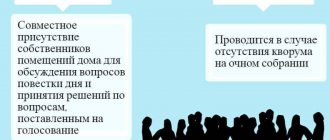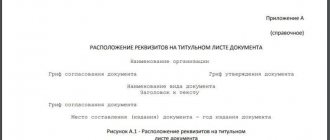Source: RosKvartal® - Internet service No. 1 for management organizations
The final decision of the general meeting must be formalized in the form of minutes of the general meeting with all voting ballots attached to it. The minutes must be drawn up in writing no later than 10 days from the date of the meeting, since no later than this period the results of the meeting must be brought to the attention of the owners of the premises in the house (Part 3 of Article 46 of the Housing Code of the Russian Federation).
In the case of an absentee meeting or an absentee part of an in-person meeting, this period is fixed from the end of the reception of written decisions of the owners, established in the notice of the general meeting. All data must correspond to those specified in the notification of the OSS.
The requirements for the preparation of the protocol are established by order of the Ministry of Construction of the Russian Federation dated January 28, 2019 No. 44/pr. The secretary of the general meeting, whose candidacy was selected at the OSS, conducts and draws up the minutes.
Protocol header
- title of the document “Minutes of the general meeting of owners of premises in an apartment building”;
- date (the date of the minutes is the date of summing up the results of the general meeting: the end of the counting of votes) and the registration number of the minutes (serial number from the beginning of the calendar year);
- date of the meeting (if the meeting lasted several days, then the start date and end date of the meeting are indicated);
- place of the meeting (indicate the address at which the meeting was held in person, or the address at which decisions were collected if the meeting was held in absentia);
- title to the content part (must contain information about the address of the MKD, the type of general meeting and the form of its holding).
In-person and absentee voting
When and why is it necessary to conduct an OSS in the form of in-person and absentee voting of owners ? After all, for this there are separate forms of in-person and absentee voting. The thing is that both of these forms do not always bring results, since often there is simply not a quorum to make important decisions at the general meeting of homeowners.
In-person and absentee voting combines both forms of conducting an OSS and allows you to discuss issues on the agenda in person and make decisions on them, as well as transfer decisions of homeowners by absentee voting within the prescribed period to the address specified in the notice of the event (Part 3 Article 47 of the Housing Code of the Russian Federation). Read more about this in our article.
This is convenient because if during the in-person voting there was not a quorum to make decisions on the issues on the agenda, then it can be achieved through absentee voting. Particularly relevant is the in-person and absentee form of voting by homeowners when considering agenda items on which decisions are required by 2/3 of the votes of the owners of premises in the apartment building (clauses 1.1-1, 1.2, part 2, article 44 of the Housing Code of the Russian Federation).
Contents of the protocol
- Information about the initiator of the OSS: for legal entities, full name, OGRN, record number of the state registration of the legal entity, TIN; for individuals - full name in accordance with the identification document, room number and details of the document confirming ownership of such premises;
- Information about the chairman, secretary and members of the counting commission: full name, room numbers and details of documents confirming ownership of the specified premises (if the issue of choosing these persons is not included in the agenda of the meeting);
- Information about those present and invited;
Those present are those owners who attended the meeting in person. The invitees can be different people, for example, a lawyer who can explain some legal issues to the owners.
For invited persons, the protocol indicates the full name, passport details and purpose of participation - for individuals; OGRN, name of the legal entity, if necessary - power of attorney (for legal entities).
- Quorum information;
You need to indicate the total number of votes (separately for residential and non-residential premises), the next line is the presence of a quorum. The number of votes of owners present at the meeting, expressed as a percentage of the total number of votes, is the quorum.
- Information on the total area of residential and non-residential premises in the apartment building;
- Agenda;
All items on the agenda must be numbered. For each question, the wording of the question is written, who voted how, who did not take part in the vote, and what decision was made. All wording must be in the third person plural - “adopted”, “decided”, “decided”.
- The place where the OSS documents (copies) will be stored;
- Signatures.
The protocol must be signed by at least three persons: surnames, initials and signatures of the chairman, secretary, and counting commission. There may be one person on the counting commission, but if there are more, then everyone signs. Next to the signature there should be the date when the document was signed (clause 4 of the order of the Ministry of Construction of the Russian Federation dated January 28, 2019 No. 44/pr).
If the candidates for chairman, secretary and counting commission were rejected at the meeting, the minutes are signed by the initiator of the meeting.
Voting papers are now required for any form of meeting + date of completion of the ballot
A mandatory appendix to the protocol are written decisions (ballots) with the mandatory details in them:
- for individuals - last name, first name, patronymic (the latter - if available) of the person or his representative (if the latter participates in the general meeting), indicated in accordance with the citizen’s identity document
- for legal entities - the full name and OGRN of the legal entity in accordance with its constituent documents; surname, name, patronymic (last - if available) of the representative of the invited person;
Well, a mandatory detail is the date of filling out the ballot.
A little comment about the ballots. Previously, Order 937/pr contained requirements for the mandatory attachment of written decisions to the protocol. But such decisions were binding only if the general meeting was held in the form of absentee or absentee voting. According to the new requirements, it turns out that filled out ballots are mandatory for any form of meeting. This requirement CONFLIDS to Part 4.1. Art. 48 of the Housing Code of the Russian Federation, which provides for the mandatory execution of decisions of owners in writing only when holding a meeting in absentia or in absentia. Well, regarding the face-to-face part, then in Part 4 of Art. 48 of the Housing Code of the Russian Federation, there is no obligation to make written decisions, but only the possibility of drawing up decisions in writing is provided.
Mandatory annexes to the protocol
Each protocol has a number of mandatory annexes, without which decisions of the OSS can be challenged as invalid (clause 20 of the order of the Ministry of Construction of the Russian Federation dated January 28, 2019 No. 44/pr).
1. Register of premises owners
It is necessary to indicate for each owner:
- Full name of the individual,
- name and OGRN of the legal entity,
- numbers of premises belonging to them,
- the number of votes owned by the owner.
2. Notice of the OSS
3. Register of delivery of notification of the OSS to the owners
An exception is the case when at one of the previous general meetings of owners a decision was made on a different method of notification - not by registered mail or delivery against signature, but, for example, by posting a notice on an information stand. In other cases, a register must be submitted in which the owners have signed, or a register of postal items.
4. List of owners of apartment building premises who were present at the in-person part of the meeting, as well as a list of invited persons
This list must also contain information about all owners of the premises (or their representatives).
5. Powers of attorney or copies thereof
This application is needed if there were representatives of the owners at the meeting. All powers of attorney are filed with the protocol.
6. Documents that were discussed on the agenda and about which decisions were made
For example, if a management agreement was adopted at the OSS, its text is attached.
7. Owner decisions
This is the most voluminous application. All decisions must be properly documented.
8. Other documents or materials that the decision of the OCC itself indicates as mandatory annexes to the protocol.
Template for minutes of the general meeting of owners.docx
Document status
Decisions and protocols are official documents (Part 1 of Article 46 of the RF Housing Code). This means that the mandatory requirements for protocols and decisions established by the federal executive body must be met.
An official document must certify a fact that entails legal consequences. Decisions of the OSS are binding on all owners of premises and thus entail legal consequences (Part 5 of Article 46 of the Housing Code of the Russian Federation).
Order No. 44/pr became the starting point and outlined the necessary parameters of the OSS documents; before its adoption, there were no clear rules for execution and any arbitrarily drawn up paper could be considered a protocol or a decision of the OSS until it was challenged in court. This provided unlimited opportunities for forging documents.
As a general rule, decisions of the general meeting of owners on issues put to vote are adopted by a majority vote of the total number of votes of the owners participating in this meeting (Part 1, Clause 2, Part 1.2, Article 46 of the Housing Code of the Russian Federation).
The exceptions are (clauses 1, 1.1-1, 1.2, 2, 3, 3.1, 4.2, 4.3, part 2, article 44, part 1, clause 1, part 1.2, article 46, part 1, art. 136 Housing Code of the Russian Federation):
- decisions taken by more than 50% of the total number of votes of owners of premises in MKD on the choice of the method of forming a capital repair fund, the choice of a person authorized to open a special account and carry out transactions with the funds located on it, on vesting the MKD council with decision-making powers on the current repair of common property in an apartment building and the decision to create a HOA in one apartment building;
- individual decisions made by a majority of at least two-thirds of the total number of votes of the owners of premises in an apartment building, for example, decisions on the reconstruction of an apartment building, on the construction of outbuildings and other buildings, on the reconstruction and (or) redevelopment of premises included in the common property MKD, on the limits of use of the land plot on which the apartment building is located, on the use of the common property of the owners of premises in the apartment building by other persons;
- decisions on consent to the transfer of residential premises to non-residential premises if there is more than one entrance in the house, adopted by a majority vote of the total number of votes of the owners taking part in the meeting, subject to voting for the adoption of this decision by the owners of premises located in the same entrance with the transferred premises, having a majority of votes from the total number of votes of such owners.
The Counting Commission processes the ballots and tallies the voting results. You can read how to count votes correctly here
The composition of the counting commission is determined by the owners at the general meeting. Only those votes for which the owner has chosen only one answer option in the written decision are counted. Otherwise, the decisions are considered invalid. If there are several questions on the agenda, one incorrect answer does not invalidate the entire decision (Part 6, Article 48 of the RF Housing Code).
The final decision of the general meeting is documented in a protocol with all voting ballots attached to it. The requirements for the protocol are regulated in detail by Order of the Ministry of Construction and Housing and Communal Services of the Russian Federation dated December 25, 2015 No. 937/pr.
The minutes of the general meeting are prepared within the time limits established by the general meeting of owners of the premises of an apartment building, but no later than 10 days after the meeting.
Responsibility for forgery of OSS documents
Since the minutes of the general meeting and forms of decisions of the owners have the status of official documents, there is criminal liability for their forgery.
Forgery of OSS documents under Part 1 of Art. 327 of the Criminal Code of the Russian Federation is punishable by:
- restriction of freedom for up to 2 years,
- forced labor for up to 2 years,
- arrest for up to 6 months,
- imprisonment for up to 2 years.
Part 3 art. 327 of the Criminal Code of the Russian Federation provides for punishment for the use of deliberately forged documents in OSS documents. If a person knows that a document is a fake, but uses it and allows the legal consequences to happen, then this is punishable:
- a fine of up to 80 thousand rubles or the amount of wages for a period of up to 6 months,
- compulsory work for up to 480 hours,
- arrest for up to 6 months,
- corrective labor for up to 2 years.
Source: RosKvartal® - Internet service No. 1 for management organizations



